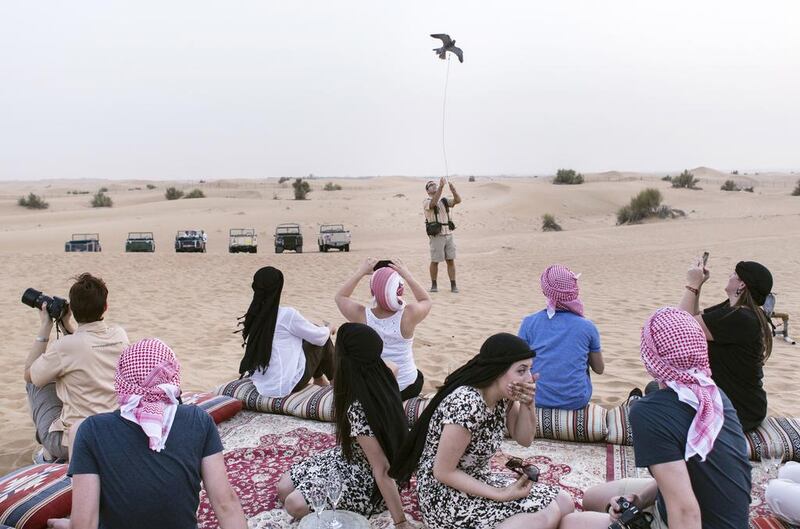DUBAI // Millions of tourists visit each year for malls, pristine beaches, landmark buildings and deserts – but many would also like to see Emiratis.
To make the short time that visitors spend in the country a more meaningful, authentic and memorable experience, they need to interact with Emiratis who can truly represent their country, city and culture.
Successful, long-term tourism depends on authenticity and part of that is the local culture and people, said Christopher Dutt, a lecturer at the Emirates Academy of Hospitality Management.
“A lot of attractions in Dubai are manufactured and don’t represent the local culture so much, although this is changing. There must be more initiatives to get locals showing off their culture,” Mr Dutt said.
“It’s an amazing culture but it’s not shown well to tourists. People see Dubai as shopping malls and I don’t think they understand or respect what it truly is.”
In a recent article in the Journal of Travel and Tourism Marketing, Mr Dutt said that showing tourists true Emirati culture would mean they had more memorable experiences to share with family and friends back home, thus increasing the likelihood that tourists would return and spend more money.
“Emiratisation is great for this and would totally change the dynamics of Dubai,” he said.
“Emiratis need to be checking you into your hotel, showing you around dive sites, telling you about their history or experiences in the desert as you go on a safari.
“On a desert safari you’re in a car for hours, during which time you could really be learning about the culture and getting to know locals.”
Although an accurate number of Emiratis in tourism is not available, Abu Dhabi’s tourism authority says they make up 1 per cent of hospitality workers.
In 2014, Dubai’s Department of Tourism and Commerce Marketing estimated that Emiratis comprised just 3,160 of the hundreds of thousands of people working in the tourism sector.
Mr Dutt acknowledged that there were considerable barriers to Emiratisation.
“There is a misconception that hospitality is about cleaning toilets, but it’s a huge industry,” he said.
“There’s also a misconception that Emiratis aren’t hard-working, so when they are employed they aren’t challenged enough. They get bored and leave because they aren’t pushed and given opportunities to grow.”
Patrick Antaki, general manager of the Al Maha resort in Dubai and Le Meridien hotel in Fujairah, said the challenges were similar across the country. He is also a board member of the Fujairah Tourism and Antiquities Authority.
“I’m talking to the authority about getting locals to guide people around the museum and antiquities sites,” said Mr Antaki.
“They could relay stories about their lives, families, stories from their grandparents. That’s what tourists would like to hear.”
Mr Antaki said he would like to have Emiratis at Al Maha resort take guests into the desert.
“Imagine being under the stars hearing stories told by an Emirati. It would totally enhance a visitor’s experience. People go to countries like Egypt and Turkey for that authentic experience, so why not do that here?”
Social stigma remained the biggest hurdle, said Mr Antaki.
“In Dubai it’s developing quicker, but in Fujairah it’s been more traditional so it’s taking time to change. It needs to happen at school level with youth programmes to encourage locals into the industry.” Ahmed Al Blooshi, who is on the board of the Fujairah Tourism and Antiquities Authority, said it was doing its best to hire Emiratis.
“Within the next five or 10 years you’ll find more Emiratis,” Mr Al Blooshi said.
For now, low salaries remain a hurdle.
“You can’t expect an Emirati to live on Dh5,000 a month when they can get Dh10,000 elsewhere, but as wages go up you will see things change,” he said.
mswan@thenational.ae






